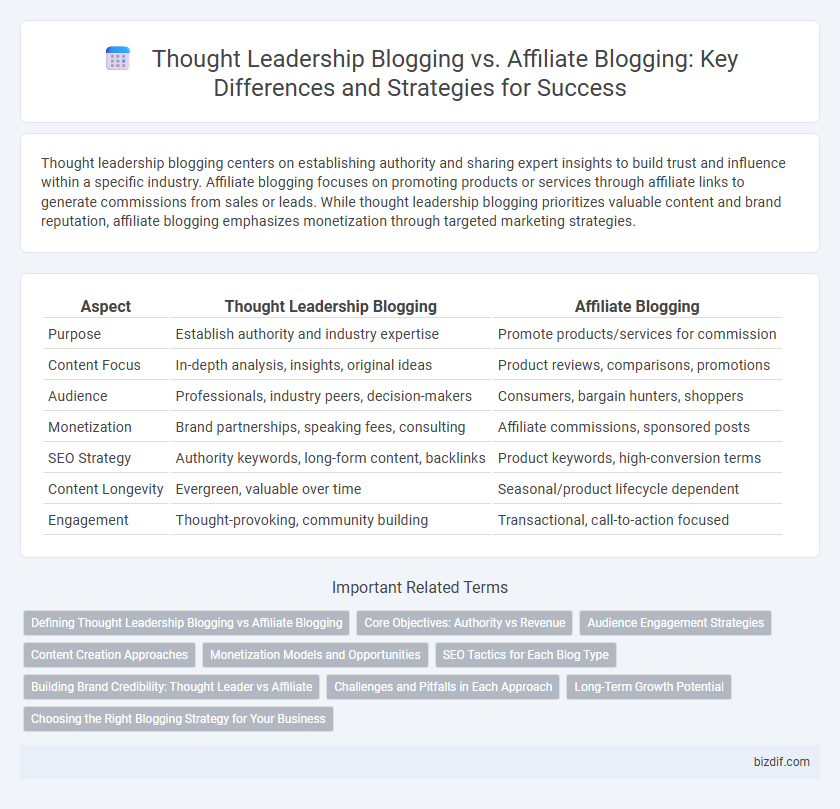Thought leadership blogging centers on establishing authority and sharing expert insights to build trust and influence within a specific industry. Affiliate blogging focuses on promoting products or services through affiliate links to generate commissions from sales or leads. While thought leadership blogging prioritizes valuable content and brand reputation, affiliate blogging emphasizes monetization through targeted marketing strategies.
Table of Comparison
| Aspect | Thought Leadership Blogging | Affiliate Blogging |
|---|---|---|
| Purpose | Establish authority and industry expertise | Promote products/services for commission |
| Content Focus | In-depth analysis, insights, original ideas | Product reviews, comparisons, promotions |
| Audience | Professionals, industry peers, decision-makers | Consumers, bargain hunters, shoppers |
| Monetization | Brand partnerships, speaking fees, consulting | Affiliate commissions, sponsored posts |
| SEO Strategy | Authority keywords, long-form content, backlinks | Product keywords, high-conversion terms |
| Content Longevity | Evergreen, valuable over time | Seasonal/product lifecycle dependent |
| Engagement | Thought-provoking, community building | Transactional, call-to-action focused |
Defining Thought Leadership Blogging vs Affiliate Blogging
Thought leadership blogging focuses on establishing authority and expertise in a specific industry by delivering insightful, original content that educates and influences the audience. Affiliate blogging centers on promoting products or services through affiliate links, aiming to generate commissions from sales driven by the blog's traffic. The primary difference lies in thought leadership blogs prioritizing value and credibility, whereas affiliate blogs prioritize monetization through affiliate marketing strategies.
Core Objectives: Authority vs Revenue
Thought leadership blogging centers on establishing authority and credibility within a specific niche by providing insightful, expert content that builds trust and influences industry conversations. Affiliate blogging prioritizes generating revenue through promoting third-party products, relying heavily on conversion-driven content and targeted calls-to-action. While thought leadership aims to foster long-term audience loyalty and brand recognition, affiliate blogging focuses on immediate financial returns through affiliate commissions.
Audience Engagement Strategies
Thought leadership blogging emphasizes authoritative, insightful content that builds trust and long-term relationships, engaging audiences through expert analysis and original perspectives. Affiliate blogging focuses on product promotion, using targeted calls-to-action and persuasive reviews to drive conversions and maximize affiliate commissions. Effective audience engagement strategies differ by blog type, with thought leaders prioritizing educational value and affiliates leveraging SEO and persuasive content to capture buyer intent.
Content Creation Approaches
Thought leadership blogging emphasizes creating original, insightful content that establishes authority and builds trust within a niche, often involving in-depth research and expert opinions. Affiliate blogging focuses on content designed to drive conversions and sales, employing product reviews, comparisons, and promotional strategies tailored to target audience buying behaviors. Both approaches require a strategic content plan, but thought leadership prioritizes value and expertise, while affiliate blogging centers on persuasive, performance-driven content.
Monetization Models and Opportunities
Thought leadership blogging monetizes primarily through brand partnerships, sponsored content, and premium memberships by leveraging authority and trust within a niche. Affiliate blogging generates revenue by promoting products via affiliate links, earning commissions on sales driven through the blog's referrals. Thought leadership offers long-term monetization through reputation and consulting, while affiliate blogging provides immediate income through targeted audience purchases.
SEO Tactics for Each Blog Type
Thought leadership blogging leverages in-depth, original content and authoritative backlinks to dominate niche search terms, boosting brand credibility and organic traffic. Affiliate blogging emphasizes keyword-rich product reviews, comparison guides, and strategic internal linking to capture high-conversion, buyer-intent traffic in competitive commercial search queries. Effective SEO tactics for thought leadership include creating comprehensive pillar content and earning editorial links, while affiliate blogs benefit from optimizing for transactional keywords and utilizing rich snippets for enhanced SERP visibility.
Building Brand Credibility: Thought Leader vs Affiliate
Thought leadership blogging establishes brand credibility by showcasing industry expertise, original insights, and authoritative content that builds trust and long-term audience loyalty. Affiliate blogging primarily focuses on product promotion and generating commissions, which can undermine perceived authenticity and make it harder to build a lasting credible brand. Effective thought leadership distinguishes brands through consistent value-driven content, while affiliate blogging relies on transactional engagement that may limit credibility growth.
Challenges and Pitfalls in Each Approach
Thought leadership blogging faces challenges such as establishing credibility, producing original, high-quality content, and sustaining audience engagement over time without appearing self-promotional. Affiliate blogging pitfalls include dependency on third-party products, navigating fluctuating commission rates, and the risk of diminished trust due to overt sales tactics. Both approaches require strategic content planning and ethical considerations to maintain long-term success and authority in their respective niches.
Long-Term Growth Potential
Thought leadership blogging builds authority and trust by providing expert insights and original content, fostering a loyal audience and sustainable organic traffic over time. Affiliate blogging focuses on promoting products for commissions, often generating quicker revenue but relying heavily on marketing trends and fluctuating commissions. Long-term growth potential favors thought leadership blogging due to its ability to create lasting value and establish a strong personal or brand reputation.
Choosing the Right Blogging Strategy for Your Business
Thought leadership blogging builds brand authority by sharing expert insights and industry knowledge, attracting a loyal audience through valuable content. In contrast, affiliate blogging focuses on promoting products and earning commissions, prioritizing monetization over deep expertise. Selecting the right blogging strategy depends on your business goals--whether you aim to establish credibility and long-term influence or generate immediate revenue through affiliate partnerships.
Thought Leadership Blogging vs Affiliate Blogging Infographic

 bizdif.com
bizdif.com